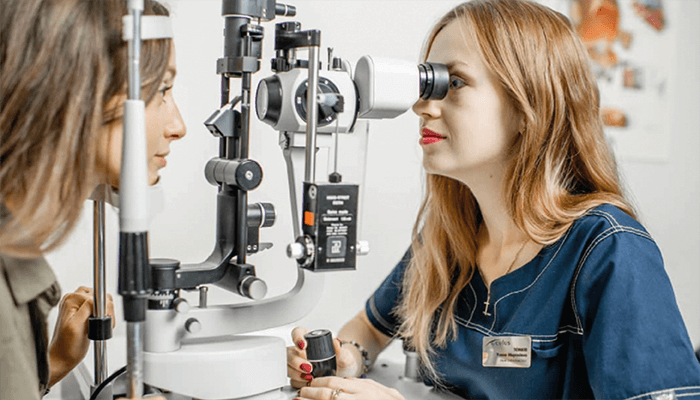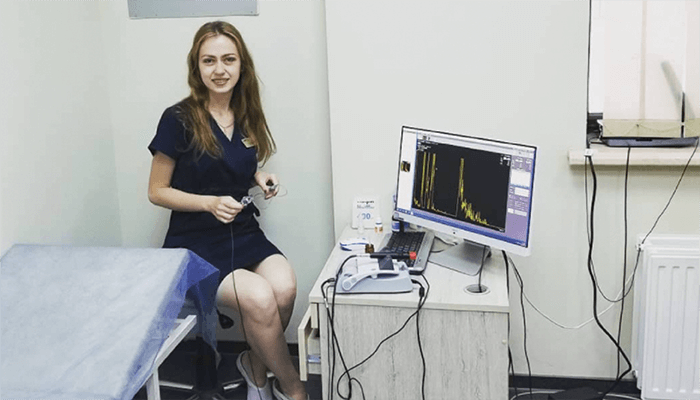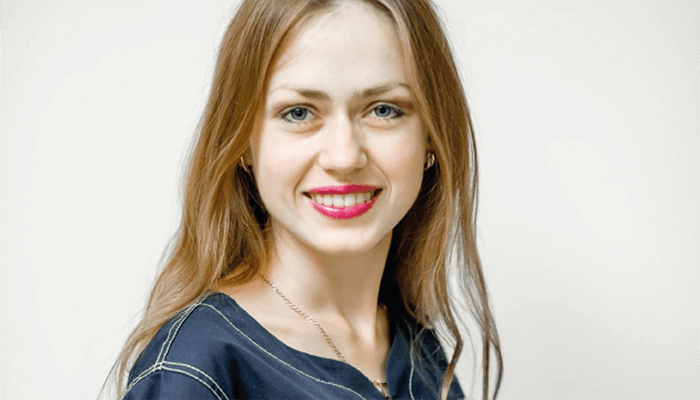
Given the rapidly-changing situation in Ukraine, readers should note that this interview was held on March 14 and authorized on March 21.
On March 19, Russian missiles hit an aircraft repair plant just 6 km (4 miles) from the center of Lviv, raising concerns that strikes in the western part of the country will increase.
Are you safe? How about your colleagues?
My family and I are relatively safe. We are in Lviv – so away from the frontlines, but sirens sound daily, warning us of the looming threat of missile strikes. Large cities in the western region located approximately 100 km away from Lviv have already been hit by missiles. On March 13, the International Peacekeeping and Security Center located 30 km from my home was destroyed. Some of my colleagues have stayed in cities that are being bombed by Russia to provide urgent ophthalmic care; others evacuated to western regions and Poland. Contact with some colleagues is currently lost.
Most of the colleagues I am in contact with are still practicing. Ophthalmologists who were forced to evacuate with their families to western regions or abroad are volunteering, helping in refugee centers, organizing collections and delivery of necessary medications, and humanitarian aid to regions suffering hostilities.
How is the Russian invasion affecting the practice of ophthalmology in Ukraine?
Russia’s invasion has a huge negative impact on ophthalmology practice in Ukraine. With the imposition of martial law, all elective surgeries in state hospitals have been suspended. Many private eye clinics stopped working – even in safer western and central regions, with patients counseled online. In the eastern, northern, and southern regions where hostilities occur, the situation is very difficult: cities are being bombed by the Russian army and people are afraid to leave their homes. Hospitals are often under fire. The state ophthalmology clinics provide urgent medical care for patients with military and civil ocular trauma, especially penetrating open eye injuries.
In western parts of the country, we have been observing a decrease in the total number of patients. Many of them postpone visits and treatment because they aren’t able to get to the clinic due to interruptions of suburban transport and car inspections at checkpoints. Patients miss scheduled intravitreal injections and postoperative examinations, which could lead to vision loss. Nowadays, most ophthalmologist appointments in private settings include acute conditions, and surgeries such as vitrectomy (retinal detachment, vitreous hemorrhage, ocular trauma) and glaucoma surgery.
Has the teaching in medical schools been affected by the war?
After the imposition of martial law on February 24, many Ukrainian medical universities stopped working. In most of these universities, the educational process was resumed on March 14, and is carried out by distance learning with online platforms. The medical school of Karazin Kharkiv National University temporarily suspended educational activities due to intense shelling of the city and fighting. The staff of medical universities have been providing medical care to the wounded, counseling patients online, and conducting medical training for the Ukrainian armed forces.
Have you had to learn and do things in the past two weeks you never imagined yourself having to do?
I never thought that in the 21st century in the center of Europe I would be in danger in my hometown because Russia decided to occupy and destroy Ukraine. I never thought I would have to hide in a shelter or a cellar when sirens sound in the city to warn that missiles have been fired. Every time we hear them, we grab a pre-packed bag with documents and necessities, and run to the nearest hiding place. We wait until the alarm ends and then exhale with relief when nothing happens. We quickly flip through the latest news to make sure that nothing happened in cities where our relatives, friends, and colleagues stay. All our days have become the same as one another. If I get asked what day of the week it is, I struggle to answer – but I know exactly what day of the war it is.
I have completely revised my values. Almost all material objects mean absolutely nothing, and those that really matter can fit into a bag, pocket, or even in the palm of my hand.
Before the current invasion started, did you have any contingency plans?
No, I have never thought about contingency plans; I never thought I needed to. I couldn’t imagine myself waking up one morning and realizing that the war had started, despite many journalists warning that it could happen. I think it’s human nature to be optimistic and not expect the worst to happen.
What are the major and most pressing challenges Ukrainian ophthalmologists are facing?
The most pressing challenge is military ocular trauma, which usually requires multiple surgical procedures and treatments at several facilities to save the eye. It is usually caused by metal shrapnel, dirt, and other objects ejected by explosions landing in the eye, and is associated with concomitant injuries to the head, neck, face, and other parts of the body.
We strive to provide the best quality ophthalmic care for our patients, but international company representatives and suppliers have ceased activities in Ukraine. Stocks of consumables and medical devices required for eye surgeries are running out. If new supply routes or distributors are not found, urgent and elective surgeries may become impossible in the near future. In the regions that are being actively bombed, ophthalmology departments already have an insufficient number of consumables and medicines, and delivery of new supplies is often impossible.
We would be very grateful if our foreign colleagues could help us with supplies and consumables for eye surgeries (such as viscoelastic, sutures, Constellation cassettes, dyes, vitreous substitutes, medications). We are now also struggling to find contact lenses for patients; our stocks of toric contact lenses are depleted. Due to a significant increase in military ocular trauma cases, my colleagues often need additional training or information on treating combat eye trauma.

You traveled abroad professionally and have worked with colleagues from abroad. Have those colleagues been in touch? Did you have any professional ties with colleagues in Russia?
After the beginning of the war, foreign ophthalmologists I previously met at scientific conferences got in touch with me. I have received messages of support from Germany, Bulgaria, Poland, Romania, and Turkey. They offered me help, but I decided to stay in Ukraine. Bulgarian ophthalmologist Atanas Bogoev created a site – www.ophthalmology24.com – where every Ukrainian ophthalmologist or resident in need of help, relocation, or accommodation can get in touch with people offering aid in Europe. I am glad that this informal initiative of help was launched and supported by colleagues from abroad.
I didn’t have any professional ties with colleagues in Russia, though I do know some Russian ophthalmologists; we previously followed each other on social networks, but no one has contacted me.
Do you have a message for the ophthalmology community around the world?
On February 24, Russia declared war on Ukraine and launched a large-scale invasion. The Russian military is shelling and destroying infrastructure facilities and residential areas in Ukrainian cities. Today, thousands of Ukrainians are being killed on our land by artillery shelling, clusters, and vacuum bombs. My peaceful country is fighting for its freedom and independence. In these terrible times, I urge everyone to support Ukraine.

